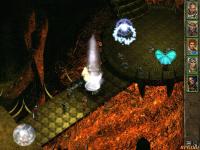|
|
|
Main News Forums Games Games Database Top 100 Release List Support Files Features Reviews Previews Interviews Editorials Diaries Misc Download Gallery Music Screenshots Videos Miscellaneous Staff Members Privacy Statement |
Sequels: Good or Bad for CRPGs? by Chaerea, 2001-10-11 David 'Chaerea' Kay, Australian Fantasy Author and RPGDot staff member has written about his thoughts regarding Sequels of CRPG's and whether they are good or bad for the genre (or even for the business in the whole). Originality in games is an elusive thing. ‘Stunningly original!’ has pretty much become industry code for ‘lacklustre clone.’ However, there are plenty of original games out there, and we as role players, have been blessed with quite a few. At first, you might not think so. The CRPG market is one replete with sequels. A sequel is not necessarily unoriginal, however. Just because a game bears the –4 after its title, doesn’t mean a bit of imagination hasn’t gone into the game. To illustrate this I’m going to go back a few years (a bad sign, I know) to the Ultima series. Now the first three titles in this series were fairly standard CRPG fare. The real innovation came with the fourth instalment of the series. Ultima IV decided to put the RP back into CRPG. Ultima IV presented players with a very strong, well defined role, the heroic Avatar, and then asked you to play that role. No stealing, no killing just for the fun of it. These were no-nos to any budding Avatar. If you wanted to be the heroic defender of the realm, you had to act like one. Role-playing on computers was revolutionised. Few games since have managed to capture this- the construct of a strong role that players have to play to. Ultima did not rest on its laurels. The advantage of Ultima was that each sequel moved the CRPG genre forward. Of course this fell apart in the eighth and ninth installments, but there’s no such things as the perfect example. Of course, the Ultima series stands out as one that is not
content to rest on its laurels. No endless versions of the
same game (Might and Magic) no sequels that really don’t
mean anything (Wizardry). Each sequel tried, and most succeeded,
in bringing something new, something fresh, to the genre. Talking of no such thing as the perfect example, Baldur’s Gate II is a good example of the ‘bad’ sequel. It’s essentially the same game as the first, sticking closely to the more/faster better theme that made Diablo II the game it is. I’m not saying these kinds of sequels are bad games- they are still fun to play (I think. Personally I didn’t think much of Diablo II and didn’t buy Baldur’s Gate II, recognizing the type of sequel it was. What, you may ask, about those single title games then? Recently we have had a slew of them, Soulbringer and Arcanum to game just 2. None of these games have been original as such, and, in my opinion, they offer satisfying diversion, but do little to advance the genre as a whole. In fact, I have yet to see a game that comes even close to the depth of the ‘great’ Ultimas (IV-VII), though I do like the Steampunk and Magic setting of Arcanum. I’m sure there’s more than a little rose-tinted visioning of the past going on, but seriously, when was the last time an RGP revolutionized your opinion of what the genre could be? Don’t make the excuse of ‘we’re too far down the track now for any real revolution.’ That’s just muddy thinking. There are plenty of ways to revolutionize this genre, it just takes effort and some original thinking. Richard Garriott, whatever you think of him now, came up with the Ultima concept by himself. Surely the huge teams that work on modern CRPGs can do as well? It’s a question we should all be asking. |
|||
|
All original content of this site is copyrighted by RPGWatch. Copying or reproducing of any part of this site is strictly prohibited. Taking anything from this site without authorisation will be considered stealing and we'll be forced to visit you and jump on your legs until you give it back. |
||




